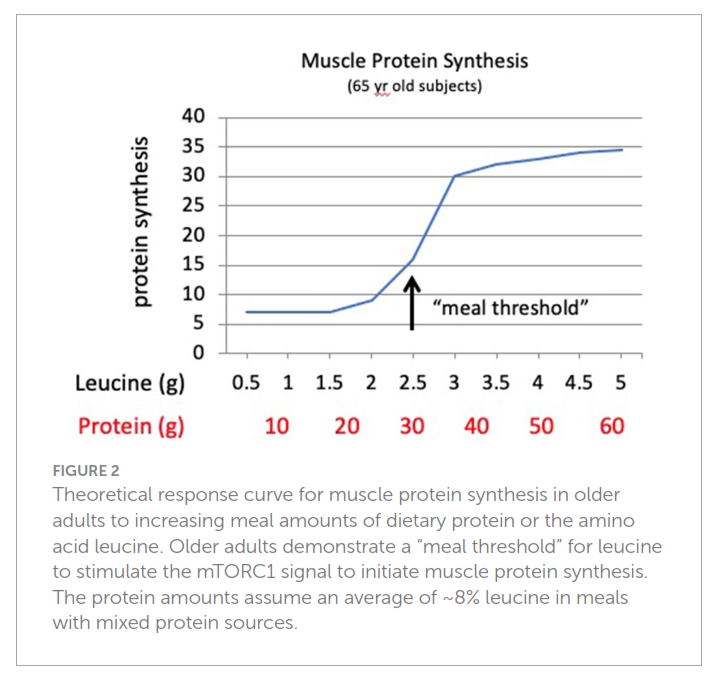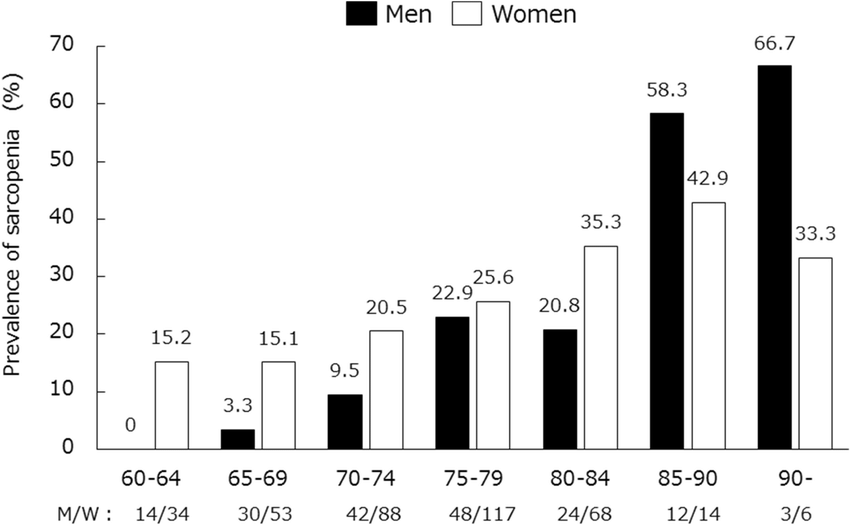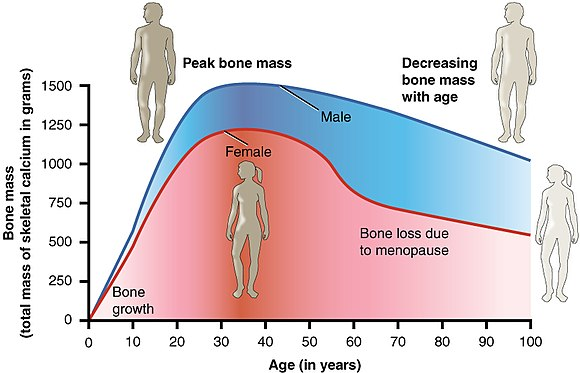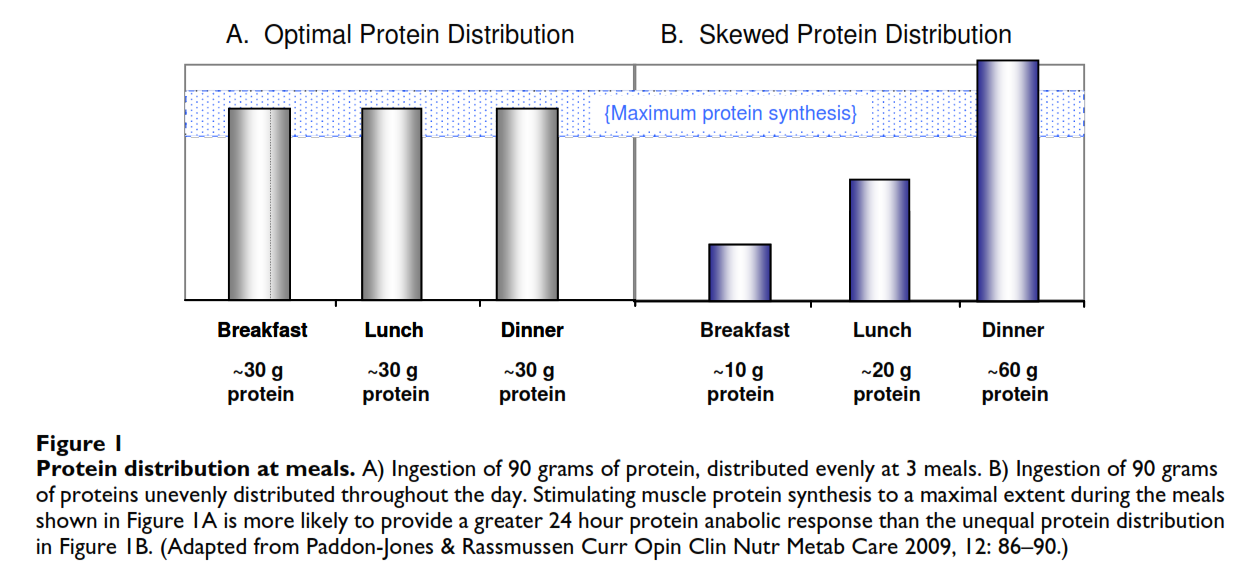Impacts of protein quantity and distribution on body composition
-
I have heard that it is important to have a big breakfast. This article describes how you need a bolus of about 2.5-3 grams of leucine to turn on muscle synthesis with breakfast.

Impacts of protein quantity and distribution on body composition (2024)
Recommendations
Based on the weight of available evidence, we believe that older adults benefit from daily protein intakes above the RDA ranging from 1.2 to 1.6 g/kg (27). Furthermore, the evidence supporting the anabolic response at the first meal is robust, and we strongly recommend increasing protein intake at breakfast to at least 30 g of high-quality protein (2, 3). The optimal distribution of dietary protein across all meals requires additional research and an integrated understanding of the interrelationships of dietary protein quantity, quality, and meal distribution with age and physical activity.
-
 D DavidPS referenced this topic on
D DavidPS referenced this topic on
-
It looks like there are .4 g leucine in 28 g (1 oz) of red meat.
That would mean, to reach 2.5 g leucine, one would have to eat 6 oz of red meat.
Is that right? -
@AinmBeo said in Impacts of protein quantity and distribution on body composition:
It looks like there are .4 g leucine in 28 g (1 oz) of red meat.
That would mean, to reach 2.5 g leucine, one would have to eat 6 oz of red meat.
Is that right?That is close enough.
Leucine is highest in animal products. So you might consider eggs, dairy or fish to meet the goal.
I used chronometer for a few days to learn how to get enough leucine in my diet. I focus on the first and last meal of the day.
-
I think desiring an activation of mTOR is not good. Inhibiting would probably be more healthy. But seem people are more focused on mucsle gains than longevity.
-
Great find @DavidPS !
Similarly, in a weight loss study conducted with community-dwelling older adults (~70 years old), participants who voluntarily shifted daily protein intake from dinner to earlier meals lost more total weight and more body fat without changing total daily protein intake (51). The researchers concluded that “a more even pattern of protein intake was associated with a greater decline in BMI and abdominal fat”.
In a second study utilizing the same diet protocol, we evaluated the additive and synergistic effects of dietary protein and resistance exercise on body composition changes during weight loss (50). Utilizing a 2 × 2 design, 48 women (BMI ~33; age ~ 46 years) were randomly assigned to one of four treatment groups: low protein, low protein with exercise, higher protein, and higher protein with exercise. Similar to the previous study, the dinner meals were similar across all groups. The primary diet differences were increased protein and reduced carbohydrates at the first two meals in the higher protein groups. After 16 weeks, the higher protein (diet only) group lost 12% more body weight, 18% more body fat, and 25% less lean body mass compared to the low protein group. Consistent with the previous study, 35% of the weight lost for the low protein group was fat-free mass, and 25% for the higher protein group.
The exercise treatment consisted of 5 days/week of walking for 30 min and 2 days/week of resistance exercise (49). After 16 weeks, the higher protein + exercise group lost 46% more body weight, 60% more body fat, and 40% less fat-free mass compared with the low protein + exercise group. This study demonstrated the synergistic effects of dietary protein and exercise to improve body composition during energy restriction for weight loss. Furthermore, the addition of 16 weeks of exercise to the low protein treatment group resulted in the loss of an additional 0.5 kg of body fat compared with the low protein group without exercise, while the addition of exercise to the higher protein group resulted in the loss of an additional 2.9 kg of body fat compared to the diet group without exercise. To the best of our knowledge, this was the first study to demonstrate the interactive effect of dietary protein and exercise on improving body composition in adult women during weight loss.
-
@Mauritio - Happy New Year! I believe that I understand your point of view. However, I think that it is more nuanced. It depends on where one is in ones life journey.
After a certain point in life, sarcopenia (loss of muscle mass) becomes important.

There is a similar issue with bone.
 https://upload.wikimedia.org/wikipedia/commons/thumb/9/91/615_Age_and_Bone_Mass.jpg/580px-615_Age_and_Bone_Mass.jpg
https://upload.wikimedia.org/wikipedia/commons/thumb/9/91/615_Age_and_Bone_Mass.jpg/580px-615_Age_and_Bone_Mass.jpgI am in the “season of my life” where it is expected that I would be losing both bone and muscle. Yet, since November 2020 is have gained 16.8 lbs of muscle and 2.2 lbs of bone mass. One of the things that I like about this article is that it set forth a minimum protein level that is needed for MTOR activation.
I am more interested in healthspan. Enjoy it while you got it.
-
@Fractal - Happy New Year!
The author of the study is a Professor of Nutrition (emeritus) University of Illinois, He has a focus on protein for “muscle-centric” health. In a second article he describes how much protein is too much.
Dietary Guidelines should reflect new understandings about adult protein needs (2009)

-
I agree that priorities and perspectives change over time.
-
@DavidPS - I plan to track my biometrics. Will you recommend at smart scale?
-
@DavidPS how much protein is too much?
-
@the_black_jew said in Impacts of protein quantity and distribution on body composition:
@DavidPS how much protein is too much?
I am not qualified to answer your question. But, I will explain what I do and why. Please do not confuse what I am currently doing with medical advice; because it isn't.
Protein - I prioritize protein. My goal is about 30 to about 50 grams three times each day. All proteins are not created equal and I monitor my diet to ensure that I fully activate the muscle protein synthesis switch shown in the first image of this thread.
Carbs - Protein is very satiating. When I am north of 50 grams for too many days, I do not eat the USDA goal for my age and gender (see table) and my sleep suffers.
As the pharmaceutical commercials often state, "ask your doctor if this is right for you."
-
Protein is also important for bones.

-
This post is deleted!
